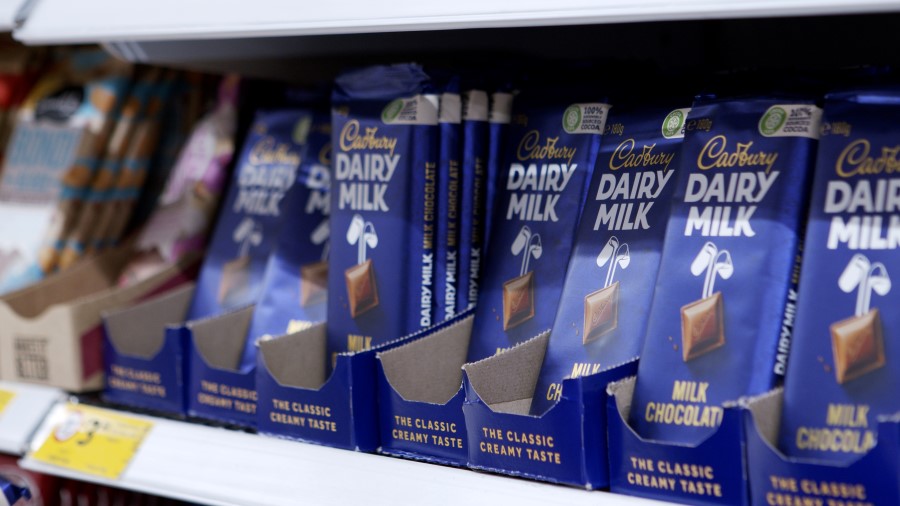
In a world first for Cadbury, the purple and gold packaging of its Dairy Milk chocolate blocks in Australia and New Zealand will soon be made with recycled soft plastic.
Sparked by consumer demand, the iconic wrapping will incorporate about 30 per cent recycled content from September in a milestone that coincides with the centenary of Cadbury manufacturing in Australia.
“The technology is brand new,” said Jake Hatton, Senior Manager, Corporate & Government Affairs, of Cadbury Australia’s parent company, Mondelez International.
“We had to scour the world to find it. It’s been a significant investment of time and resources by the business and it will be a world-first for Cadbury, which will be one of the first brands in Australia to have recycled soft plastic in its packaging.”
While the packaging itself has been recyclable for years, it has never been made with recycled content. The new technology allows hard-to-recycle soft plastic to be turned back into new, high-value packaging.
There are only a few advanced recycling facilities around the world that can do this. However, interest from brand owners is increasing.
Given there’s no local advanced recycling facilities in Australia, the sustainable packaging will be imported in large rolls from Europe.
These rolls will then be sent to packaging company Amcor in Melbourne for printing before being shipped to Cadbury Australia’s chocolate factory in Claremont, Tasmania.
“Consumers won’t even notice the difference,” Mr Hatton said.
“It behaves the same as virgin plastic. That’s the beauty of this technology; because it returns the plastic to its original building blocks, it can be made into packaging which looks and performs the same as virgin plastic.
“While we have had to import this material, we’ve demonstrated to industry that there is a market for this recycled soft plastic here in Australia.
“That then helps businesses that are looking to invest in establishing a local capability, and we’ve started to see this translate into significant project announcements seen in the past few months, which is really encouraging.”
Fellow Ai Group member Nestlé Australia is another early adopter, with its 45g KitKat bars newly packaged with 30 per cent recycled content.
Plastics recycling organisation Brightmark is building a plant in NSW and a consortia including Licella, Qenos and Plastic Energy are looking to invest a combined $100million in an advanced recycling plant in Victoria.
Cadbury Australia’s initiative has taken global effort by Mondelez.
“There was a lot of negotiation and a lot of hunting around," Mr Hatton said.
"Since then, our R&D and packaging technology teams have been working hard on trials in our factory in Tasmania.”
Mondelez hopes to inspire other companies to follow, but they’ve got to be willing to invest, Mr Hatton says.
“From a price perspective, it’s going to be more expensive than virgin plastic for the time being because the technology is so new, and volumes are so small,” he added.
“But you've got to put your money where your mouth is if you want to deliver some change in this space."
Cadbury Australia already has impressive green credentials, using 100% sustainable cocoa and switching to renewable energy in its highest emitting factories in Victoria to more than halve its carbon footprint from its operations across the whole of ANZ.
Launching packaging with recycled soft plastic in the ANZ market was an obvious choice.
“This is a first step and it’s on the most iconic product range that Cadbury Australia offers,” Mr Hatton said.
“We know consumers here are passionate about sustainability. Our research tells us that packaging and sustainability are increasingly among the top considerations that come to mind when they choose products.
“Ultimately, we want to see more readily available recycled soft plastic, ideally recycled here in Australia. And, eventually down the track, we want to get to 100% recycled content. We’re committed to meeting the national packaging targets which means we need to get to 10% recycled content across all of our soft plastic packaging by 2025, and we’re on track to get there.
“It seems right that this next generation of packaging is coming out of that very same factory in Claremont which started operations exactly 100 years ago.”
Mondelez has been a member of Ai Group since 1921.
“Just as Cadbury celebrates its 100th year of making Australia’s favourite chocolate at our home in Claremont, Tasmania, we’ve just passed 100 years as a member of Ai Group. We wouldn’t have partnered with Ai Group for more than a century if it didn’t deliver the value-add we expect from a peak industry group representing the interests of businesses like ours. Ai Group provides us with expert insights on emerging trends, advocates on issues that are impacting broader industry and works hard to ensure the nation continues to benefit from a strong and productive private sector.” — Jake Hatton, Senior Manager, Corporate & Government Affairs, Mondelez Australia

Wendy Larter is Communications Manager at the Australian Industry Group. She has more than 20 years’ experience as a reporter, features writer, contributor and sub-editor for newspapers and magazines including The Courier-Mail in Brisbane and Metro, the News of the World, The Times and Elle in the UK.